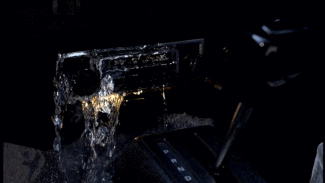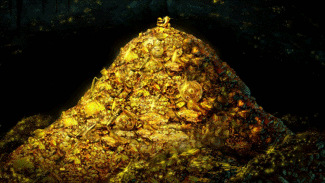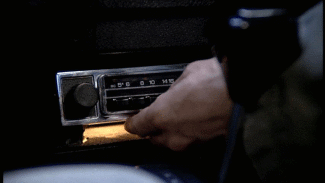04/10/05:

During early 2004, a young Portland Oregon lawyer named Brandon Mayfield had his life turned upside down when the FBI arrested him and put him in secret confinement for a couple of weeks, until it finally allowed his wife to know where he was. The charges were "terrorism," and the grounds were that the FBI, in responding to a Spanish request for assistance to seek a digital match of a fingerprint found on a piece of plastic connected to the Madrid train bombings, had discovered a match with Mr. Mayfield. Supposedly they then discovered that Mr. Mayfield was married to a Muslim woman, had converted to Islam, and had represented Jeffrey Battle, one of the poor dunderheads who got thrown in jail as terrorists because their blood got hot and they went off to Pakistan to pretend to do jihad. Battle went to jail, but Mr. Mayfield had nothing to do with that aspect of Battle's life -- he had represented Battle only in a child custody dispute. The FBI plowed ahead with its case, even though Mr. Mayfield was a former Air Force JAG Corps lawyer, had never been to Spain, and the Spanish police were not supporting their forensic analysis. Shortly after the election of Zapatero as the new Spanish President, the government released Mr. Mayfield when the Spanish announced they had arrested the man whose fingerprint the FBI claimed was Mr. Mayfield's.
Eventually the charges were dropped and Mr. Mayfield actually got an apology from the FBI. During his confirmation hearings, Alberto Gonzales admitted that the Patriot Act provisions had been used in Mr. Mayfield's case.
As an Oregon lawyer, the case scared the bejeezus out of me, especially when I learned that one of the facts in the affidavit true of Mr. Mayfield was also true of me! For Mayfield's wife had once made a phone call to an Ashland man named Pete Seda, a long-time Ashland resident who was my friend dating back to 1982, when I tutored him in the English lab at SOU. He was a dyslexic Arab, which is really difficult, since they read their books from back to front. So reading English was hell for him, and I'd sit and compose his essays on the typewriter while he talked out his thoughts. It was fun, and he was very intelligent and unconventional. Well, Pete is now being charged, much to the disgust of all of us in Ashland, with some kind of terrorist claim involving his receipt of funds from a now-denounced Islamic charity. So I knew Pete well, and talked with him about his fear of persecution after 911. Indeed, I went to a redneck gas station with him one afternoon in 2002, and we collected some nasty glares. Bottom line, though, Pete Seda had been a forest protection activist back in the eighties and nineties. Then he became an Islamic peace activist, and never advocated or contemplated violence for an instant. He worked day and night at his business, The Arborist, and loved his work of caring for trees. The fact that he has had to leave the country with his family is really just a pogrom in our little town.
But back to Mr. Mayfield. Obviously, if they bothered to add the fact that his wife once called Pete Seda to the affidavit they submitted to Federal Judge Bob Jones to justify secretly jailing Mr. Mayfield, then two things must be true: (1) The US Attorney engaged in a huge slander of Pete Seda in order to imply that Mr. Mayfield's wife's call to him was in any way inappropriate, and (2) The US Attorney must have been might short on real evidence to justify the secret arrest, because calling Pete Seda is something that thousands and thousands of people have done without criminal intent. Nevertheless, Judge Jones signed the order, and directed that a man be delivered to the tender mercies of the government "intelligence" apparatus.
Looking back at fact number two -- the lack of evidence to levy against Mr. Mayfield that is implied by the use of flimsy slanders against an Ashland Islamic peace activist to suggest wrongful conduct on the part of Mr. Mayfield – we might consider what they had access to. Well, most cops don’t get to search someone’s house at all, but under the Patriot Act, they can do it secretly. This creates potential for a conversation like this:
Mr. Mayfield: (Dialing 911) Hello, 911, I have a crime to report.
911 Operator: Allright sir, where is it taking place?
Mr. Mayfield: Someone has ransacked my home and office at such-and-such location. Things are missing, and out of place. There’s no sign of forced entry, and I’m concerned for my family’s safety.
911 Operator: Oh, sir we can’t take a report from you about that.
Mr. Mayfield: Why is that?
911 Operator: Well, you see, it was definitely not criminals who went into your house.
Mr. Mayfield: How is that?
911 Operator: Well, sir, I can’t tell you, but we cannot take your report.
Of course, this is absolutely not a joke, although it provokes some people to laughter. This is really horrific, and the sort of privacy invasion that is currently apparently considered constitutional by Judge Jones. As a matter of fact, since every Federal Judge has sworn to uphold the Constitution, I think they should resign before they sign even one secret search or secret arrest order.
So after getting the secret search order, what did they get from the search? Zip. Nada. Nothin’. Zero. Just his family DNA, copies of all his computer hard drives, a few cigarette butts that had already been smoked, etcetera. Then, the FBI apparently just put this data out for its people to share, distribute, examine, and spread about freely with no accounting whatsoever for that dissemination, or thinking that somehow this vast, unwarranted privacy invasion of a single man’s life would ever be unraveled.
The provisions of the Patriot Act permitting these judicially-assisted invasions of privacy, will ultimately be determined to be totally unconstitutional when the Gonzales-Ashcroft school of civil liberties is felled like the misbegotten Philistine Goliath that it is. Who will be the David who brings down this cruel, brutal, senseless enemy of freedom? Well, since we are past the days of fighting through champions, those Davids must be ourselves. If all that is required for evil to prevail is the silence of good people, then we should speak up now, before some FBI agent learns that we’ve been talking to peace activists.
The article from the Oregonian provides a smoking gun (in blue below) from the FBI’s own vault. Please note that the FBI confession is, by its own terms, incomplete, as it admits that it also conducted wiretaps and other physical searches of his life.
Bottom line – how can you protect yourself against sneek-and-peek searches? Same way you can protect yourself from thieves – covert video surveillance of your own home. In other words, we now have to protect ourselves from the government as if it were a criminal. I tell you – if Mr. Mayfield had known that Men In Black had pawed through his office, copied all his documents, disk drives, and bagged up the contents of his ashtrays, what do you think he would have done? You know, Portland is not that far from Canada, and I think sometimes the cold air up there is a good thing. Clears the head.
David Sarasohn, for The Oregonian wrote:
A new word on Mayfield, the Patriot Act
Friday, April 08, 2005
A year after he was released from prison with an FBI apology, Brandon Mayfield recently learned some more things about his arrest as a terrorist.
At the same time, Congress -- holding hearings on the reauthorization of the USA Patriot Act -- learned a little more about the act, and about what happens when Congress gives government vast new powers without stopping to think about it.
Ever since the arrest and awkward release of Mayfield, on the mistaken grounds that his fingerprint was found on an item connected with the terrorist train bombing in Spain last March, the Justice Department has insisted that the Patriot Act had nothing to do with his arrest. That insistence continued through the opening of Attorney General Alberto Gonzales' testimony Monday to the Senate Judiciary Committee -- and then ended a few hours into the testimony, when Gonzales said that, well, yes, a couple of the Patriot Act powers had been involved.
Gonzales told the senators that the FBI had indeed used new powers of electronic surveillance, as well as another section of the act, in its investigation of the Beaverton lawyer -- based on a mishandled fingerprint and, implicitly, his identity as a Muslim convert. Agents collected quite a bit.
At the end of March, as part of his lawsuit against the federal government, Mayfield's attorney received a statement:
"Mr. Mayfield is hereby notified that the following property was seized, altered or reproduced during (Foreign Intelligence Surveillance Act) searches of his residence: three hard drives of three desk top computers and one loose hard drive were copied; several documents in the residence were digitally photographed; ten DNA samples were taken and preserved on cotton swabs and six cigarette butts were seized for DNA analysis; and approximately 335 digital photographs were taken of the residence and the property therein . . . Mr. Mayfield is also hereby notified that he was the target of electronic surveillance and other physical searches authorized pursuant to FISA."
Nobody at this point thinks any of the material seized has any national security significance. Nobody now thinks the secret evidence behind the search meant anything.
People do know that anything collected can now be widely shared.
"There is no idea," says Steven T. Wax, federal public defender who first worked with Mayfield, "how many hundreds and hundreds of people, in intelligence offices around the world, now have access to private materials on Mr. Mayfield, his children and perhaps some of his clients."
Plus his family's DNA.
In fact, Mayfield can't know exactly what's out there.
"Worse still," says Rep. John Conyers, ranking Democrat on the House Judiciary Committee, "the department still refuses to give Mayfield a full accounting of what searches were conducted, when they were conducted and what exactly was seized. When an innocent man can't even find out the extent to which his rights have been violated, something is very, very wrong with our system of checks and balances."
That fear, that something has gone off the rails, is why Gonzales was called to testify this week before the Senate and House judiciary committees, considering whether to reauthorize or amend the Patriot Act. It's why a bipartisan group of senators, led by Larry Craig, R-Idaho, has reintroduced the Security and Freedom Ensured Act, which would limit the government's powers to make secret searches without showing probable cause.
"I think we've got a chance to get some of it done," says Sen. Russell Feingold, D-Wis., the only senator to vote against the Patriot Act in 2001 and now a SAFE Act co-sponsor. Feingold notes that now even Gonzales is open to some limits -- although the administration also wants other changes to expand its powers even more.
The Mayfield case, Feingold says, "had a big effect on the whole attitude that anybody who criticized the law really wasn't concerned about terrorism." When Gonzales changed course and admitted a Patriot Act role in the case, "That was noticed at the hearing."
The case resounds in other places. In Salem this week, a Patriot Act-driven House bill to require state employees to stay within the Oregon Constitution was referred to committee. Last session, the state Senate passed a resolution calling for changes in the act, 23-2, the most bipartisan thing that happened there all year. Last month, the Montana House passed a similar bill, 88-12.
"The Mayfield case certainly does touch a red button for people here," says Rep. Peter Buckley, D-Ashland, co-sponsor of the House bill. "It's one way we make the case that the Patriot Act has led to actions unacceptable to the state."
Last week, we learned more about the Mayfield case.
And just how far the Patriot Act can go.
David Sarasohn, associate editor of The Oregonian, can be reached at 503-221-8523 or [email protected].












